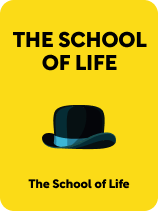

This article is an excerpt from the Shortform book guide to "The School of Life" by The School of Life. Shortform has the world's best summaries and analyses of books you should be reading.
Like this article? Sign up for a free trial here.
What’s The School of Life book about? What is emotional intelligence and why is it so important?
If you’ve ever wondered why we make the same bad choices over and over, the authors of the book The School of Life have an answer: because we lack emotional intelligence. They say, since we’re not taught how to understand and cope with emotions, this leads us to make poor decisions and to be miserable.
Read on to learn more about the book The School of Life: An Emotional Education.
The School of Life: Book Overview
In their book The School of Life, writers from The School of Life offer methods to improve our emotional intelligence in several spheres of life. They argue that we’re not taught emotional intelligence—an understanding of our and others’ feelings—in the same way that we’re taught subjects like science and history, and that this is to our great detriment. Without emotional intelligence, we bumble through life, making poor choices based on misunderstood feelings that hurt us and others. However, by taking their advice on how to be more intelligent about yourself, your relationships, your romantic partnerships, and your work, you can make smarter decisions and lead a better life.
The School of Life is an educational organization that offers books, courses, and psychotherapy to support personal growth. It was founded by the philosopher Alain De Botton, who wrote the introduction to this book.
We Lack Emotional Intelligence
The authors of The School of Life book write that as a society, we place huge stock in formal education. But we don’t educate our children or ourselves about how to deal with disappointment, anger, loss, and other difficult emotions. In other words, we don’t teach emotional intelligence. Instead, we believe people should simply follow their intuition when navigating emotional situations and that doing this will lead to the best outcomes.
For example, instead of teaching adolescents how to navigate conflicts with their friends, we allow them to do what seems intuitively best to them—which might be yelling or talking about their friend behind their back.
The Consequences of a Lack of Emotional Intelligence
Our lack of emotional intelligence means that we repeatedly make the same bad decisions in our personal lives, relationships, and work lives, write the authors. Because we don’t understand ourselves, our emotional needs, or the emotions of others, we come up with poor solutions to our emotional problems. In fact, often, the solutions we devise to our problems only exacerbate them, leaving us miserable without knowing why. Our general happiness, friendships, relationships, and work eventually suffer because of this lack of self-understanding.
Emotional Intelligence About Yourself
Understanding ourselves is extremely difficult, write the authors. This is in part because our thoughts, emotions, and beliefs are constantly changing. There are no fixed points from which we can observe our psyches. We don’t even have a fixed identity, argue the authors: This is also always in flux.
(Shortform note: The idea that we don’t have a fixed identity and that we’re constantly changing is firmly rooted in Buddhist philosophy. Buddhists label this idea “non-self,” and they contend that “we” are really just a collection of changing physical processes, feelings, perceptions, responses, and consciousness. They believe that clinging to any single view of ourselves makes us suffer because that view of ourselves will inevitably change (identifying with youth is an obvious example of this—when we inevitably age, we suffer). So Buddhists diverge from the authors on how to deal with this flux: They suggest embracing the non-self, while the authors feel you should still try to know yourself better, even though it’s hard.)
Another reason it’s hard to understand ourselves is that we’re strongly shaped by genetics and childhood experiences, but we don’t know to what extent these inform our present thoughts, feelings, and reactions. For example, you may have a reflexive disgusted reaction to seeing someone eating fish but not realize this is because your parents hated fish and told you it was disgusting growing up.
Methods of Gaining Emotional Intelligence About Yourself
It’s hard to understand yourself, but not impossible. In their book The School of Life, the authors describe some ways to increase your emotional intelligence about yourself.
Acknowledge How Little Control You Have Over Your Mind
The first step toward self-understanding is acknowledging that you’re not fully in control of your behaviors and that much of your personality and beliefs are shaped by outside forces from the past, as previously discussed. When you accept this fact, you don’t have to blame yourself for all your undesirable behaviors. You can also respond to challenges or conflicts with more equanimity and less self-righteousness: You see that you may be having a bad reaction due to a childhood experience and can accept that you might be in the wrong.
See Others as Equally Hurt and Damaged
A big reason we don’t like to introspect is that we’re afraid we’ll find abnormally bad thoughts and beliefs in our psyches. However, the authors contend that most of what we think and feel isn’t unique to us. Therefore, one method of gaining emotional intelligence is to simply understand that everyone is just as hurt, strange, and confused as we are. This will let us explore and acknowledge our own strangeness without shame and therefore cope with it better.
Emotional Intelligence About Others
Now that you know more about how to understand yourself, let’s turn to how you can be more emotionally intelligent in your interactions with others. The School of Life provides several ways of doing this, and in this overview, we’ll describe three of the book’s methods.
Communicate With Politeness and Diplomacy
Communicate with politeness and diplomacy to improve the quality of your interactions. For the authors, politeness consists of these behaviors:
- Avoiding blunt speech because this can be hurtful
- Respecting that others have different opinions and preferences and asking for those
- Offering validation and kind words because humans can be emotionally fragile
- Giving everyday kindness through small gestures
- Not taking impulsive, decisive action toward others because we may be wrong
Today, we view politeness as synonymous with inauthenticity and snobbishness. But the authors argue that this view is incorrect and that politeness—rather than frankness, which they contrast it against—would help us all get along better.
Act With Vulnerability and Warmth
According to The School of Life book, One of the best ways to connect authentically and constructively with others is to be vulnerable and warm with them. Vulnerability is effective because when we hear others vulnerably share their problems, unhappiness, or worries, we feel validated in having those ourselves. We feel less alone and less alien, which endears the sharer to us.
(Shortform note: In The Power of Vulnerability, Brené Brown also mentions that vulnerability builds trust, which is another way we become more connected to people. Brown contends that you can’t trust someone unless you understand their motives, feelings, and personality—in other words, unless they’ve opened themselves up to you.)
Another way to connect to people is to be a warm person. The authors define warmth as addressing others’ hidden insecurities and worries through kindness and vulnerability—like by heartily welcoming a newcomer to a class you’re taking or by telling them you also struggled to master concepts at first. Warm people don’t insist on formality in social interactions because they know humans need more than small talk and intellectual dialogue to feel comfortable.
Give Others the Benefit of the Doubt
According to The School of Life book, when others seem to be struggling or acting out, you can ease the tension by giving them the benefit of the doubt. This means assuming there’s an emotional or childhood wound underlying their current behavior and not holding them solely responsible for hurtful or destructive actions. Try to understand why they’re behaving badly, rather than judging them for it. The advice goes the opposite way, too: If you sense you’re acting out, try to understand why you’re doing so and communicate this reason to others.
(Shortform note: Giving others the benefit of the doubt is good for you, too. Research shows that people who habitually assume others have bad intentions are less happy in their relationships and less happy in general. This is called having a hostile attributional style. Conversely, people who habitually think the best of others (who have a benign attributional style) are happier. You can take steps to change your attributional style to be more benign—perhaps by trying to understand others’ motivations more, as the authors suggest.)
Why We Lack Emotional Intelligence in Romantic Relationships
We often fail to develop emotional intelligence in the realm of love because our conception of love is almost completely defined by the 18th-century intellectual and artistic movement, Romanticism. Among other things, Romanticism proposes the following:
- Marriage should be both emotionally and sexually fulfilling and also a practical living arrangement. It assumes after 30 years of marriage that you’ll feel the same way about your partner as you did when you first met.
- You should marry for love and not for financial or other considerations; thinking about finances and other practical questions is inappropriate and unromantic.
- You should love and accept every aspect of your partner.
The authors contend that Romanticism and the unrealistic expectations it places on intimate relationships have made it difficult to have healthy relationships. But when you know that your ideal of a successful romantic relationship is flawed, you can forgive yourself for not meeting it and develop a more workable approach to romance by building your emotional intelligence.
Now let’s look at some ways to dismantle the destructive Romantic approach to relationships and replace it with more emotionally intelligent ones.
Embrace Compromise and Mundanity
We normally frown on compromise in relationships, but the authors write that often, to compromise with a partner is truly the best option available—better than finding a new living situation or source of income, or disrupting your child’s home life, for example. We should stop seeing compromise as pathetic and instead accept that no situation is perfect.
Additionally, we feel that in love, thinking or talking about mundane concerns—like the household, shared responsibilities, money, and so on—is unromantic and even inappropriate. We believe subconsciously that such concerns shouldn’t matter to people who are truly in love. But the authors argue that discussing such tedious questions isn’t only necessary, but is actually a sign of a strong relationship. When you can talk about important but boring matters, there’s more harmony in your relationship.
Recognize Your and Their Flaws
To have a healthy relationship, acknowledge that you’re a flawed person who at times can be difficult to be around, insist the authors. This lets you take inevitable criticism from partners with more grace. Similarly, acknowledge that your partner is also deeply flawed. When they exhibit these flaws, think about how they might have developed in childhood and don’t hold your partner solely accountable for them.

———End of Preview———
Like what you just read? Read the rest of the world's best book summary and analysis of The School of Life's "The School of Life" at Shortform.
Here's what you'll find in our full The School of Life summary:
- Why most people lack emotional intelligence and make poor choices
- How emotional intelligence can make you feel more fulfilled in life
- How to gain emotional intelligence about yourself, others, relationships, and work






